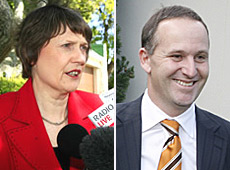5:00AM Tuesday March 04, 2008
By Fran O'Sullivan

Finance Minister Michael Cullen
*Commentary from Share Investor to come-Why I'm going to sell.
The Government has urgently toughened New Zealand's overseas investment rules, putting a new hurdle in the way of the controversial Canadian pension fund's bid for a 40 per cent stake in Auckland Airport.
The unexpected move comes just one week after the Government announced it would legislate against a multimillion-dollar tax break that the Canadian Pension Plan Investment Board planned to use to extract greater returns from the airport.
Finance Minister Michael Cullen said greater protection for New Zealand's major strategic assets will be delivered under an order-in-council requiring Cabinet ministers to take into account New Zealand control factors when considering overseas investment applications affecting a very narrow range of strategically important assets.
Dr Cullen said yesterday's changes had been made in response to the uncertainty and debate that had emerged surrounding the Canadian offer to Auckland Airport shareholders.
"There has been a high degree of public debate about handing over control of New Zealand's main gateway to the world to foreign interests.
"The Canadian Pension Plan bid was always going to require consideration under the Overseas Investment Act and there has been speculation that ministers would use existing conditions under the act to reject the offer. The Government's move today is to be clear about the fact that New Zealand control factors will be taken into account as part of the national interest tests to be applied under the act."
The Auckland Airport board has been strongly opposed to the Canadian bid, taking the view the strategic asset should stay under New Zealand control. Chairman Tony Frankham has personally briefed Prime Minister Helen Clark on critical board decisions ahead of shareholders.
The Canadian fund has to achieve acceptances from 40 per cent of shareholders for its offer of $3.655 a share by the March 13 closing date.
Fifty per cent of shareholders who take part in a separate vote must give their approval for the bid to proceed.
The Overseas Investment Office must then approve the Canadians' application by April 30, or it will lapse.
The Government's unexpected move yesterday came as a shock to the Canadian fund's lawyers last night.
Dr Cullen said the change would allow greater protection for New Zealand's strategic assets and would bring the country into line with the likes of Australia, which restricts the ownership of airports.
An order-in-council was passed to insert a new clause in the regulations requiring ministers to consider "whether the overseas investment will, or is likely to, maintain New Zealand control of strategically important infrastructure on sensitive land".
Dr Cullen emphasised the ministers considering the bid - Associate Finance Minister Clayton Cosgrove and Land Information Minister David Parker - had not played any part in discussions over the new regulation.
He also said nothing about an acceptance of any Overseas Investment application.
"New Zealand already has foreign ownership restrictions on Telecom and Air New Zealand. This process has moved quickly to provide maximum certainty to markets regarding the Government's intentions."
EXTRA HURDLE
The Overseas Investment Office must now consider:
"Whether the overseas investment will, or is likely to, assist New Zealand to maintain New Zealand control of strategically important infrastructure on sensitive land."
Cullen's move on AIA tax plan Anti-Business
NZ Herald: Airport Deal not so sweet after tax break blocked
NZX Press Release: AIA directors recommend shareholders sell
AIA profit stays grounded
Softening opposition to CPPIB bid for AIA
Directors of AIA bribe brokers not to sell
What is Auckland Airport worth to you?
Second bite at AIA by CPPIB might just fly
AIA new directors must focus on shareholders
Auckland Airport merger deal nosedives
The Canadians have landed
AIA incentive scheme must fly out the window
Government market manipulation over AIA/DAE deal
DAE move on AIA: Will it fly?
Disclosure: I own AIA shares
Share Investor 2008




